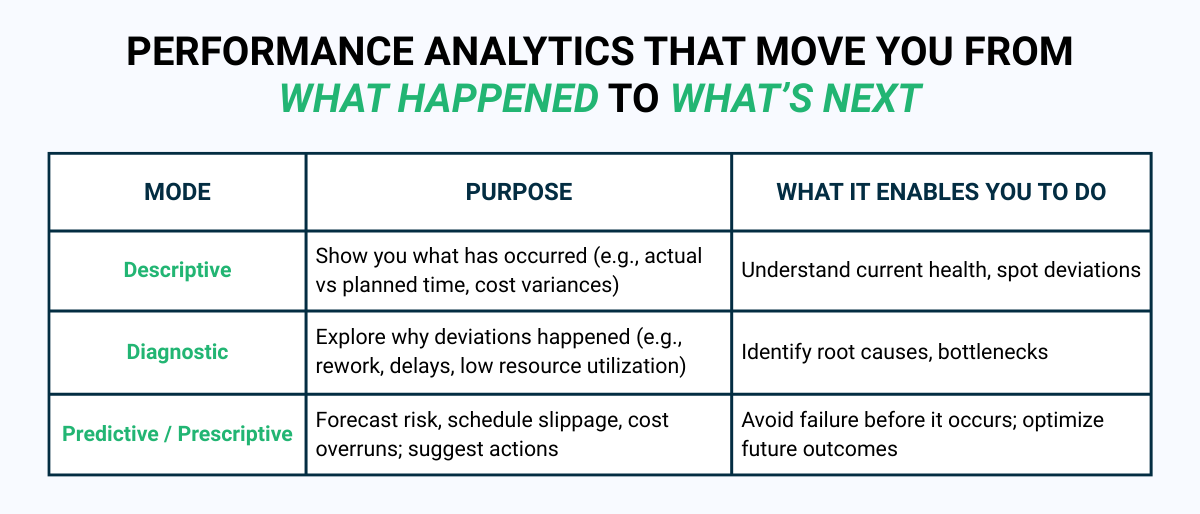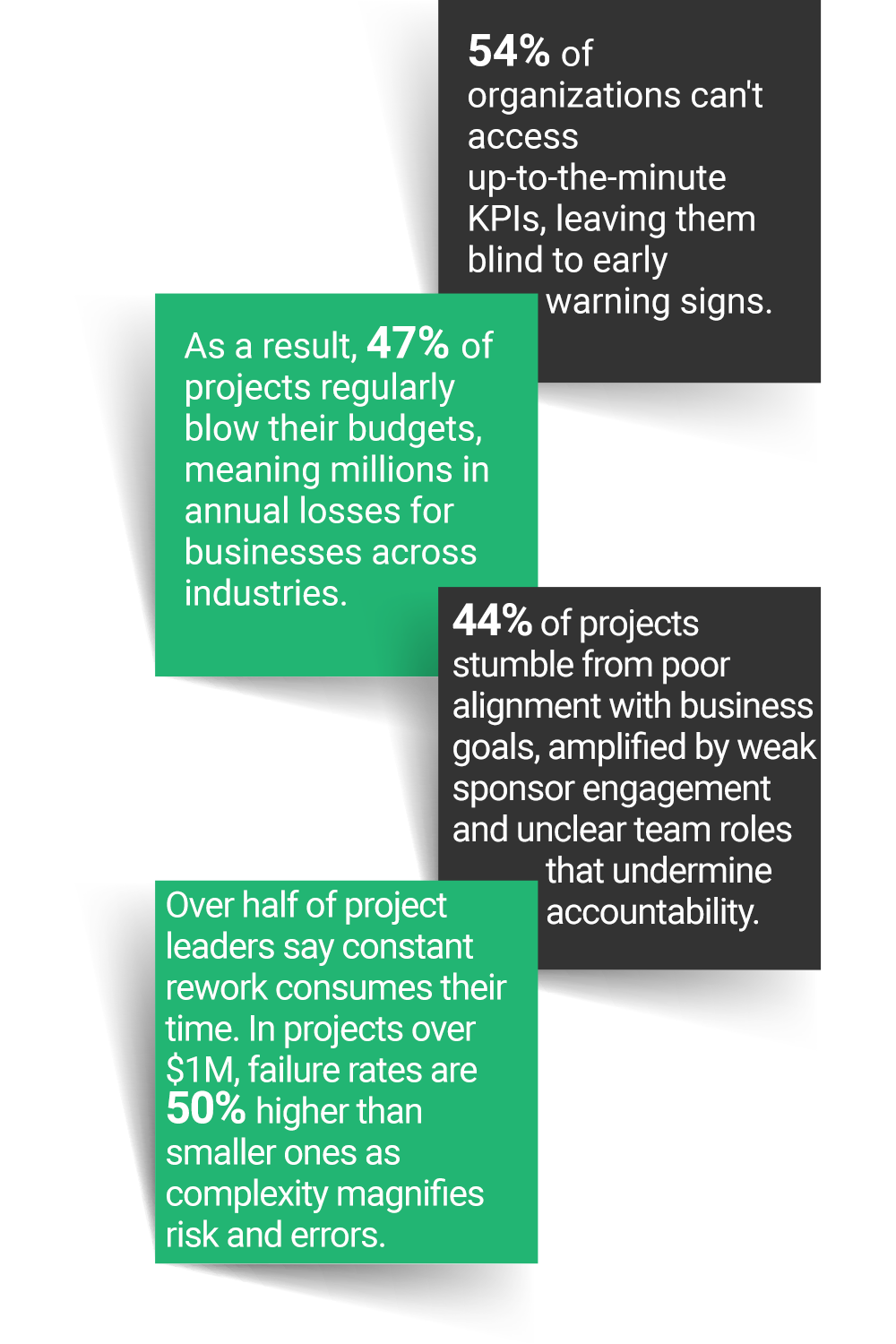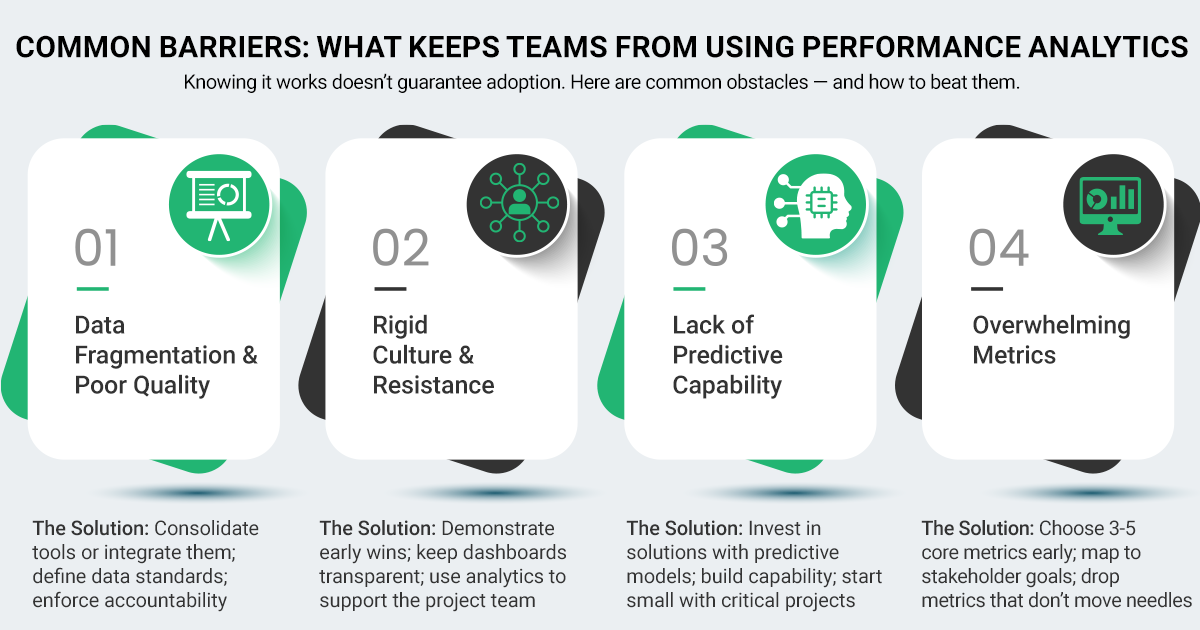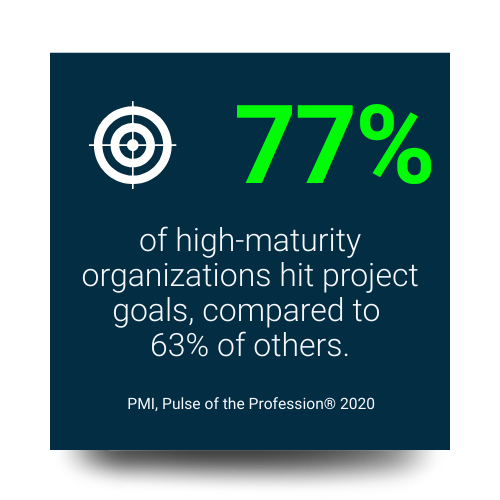
Quick Summary: Projects often derail because leaders rely on incomplete reports, fragmented data, and gut instinct. Performance analysis changes this by providing real-time visibility into cost, schedule, resources, and risks, turning scattered information into actionable insights. With predictive forecasting and tailored dashboards, managers can anticipate problems, rebalance workloads, and prevent overruns before they happen. The result is fewer failures, stronger stakeholder trust, and a repeatable path to project success.
When Projects Start Slipping, You’re Not Alone
You’ve planned every milestone, stated budgets, and assigned resources. Yet somehow, deadlines slip, and costs balloon. Stakeholders demand answers. As a project leader, you feel crushed by uncertainty and blinded by gaps in your data. This is where performance analytics for project management plays a critical role. It evaluates progress and guides vital risk-based decision-making. This approach provides unprecedented visibility into a project’s health, allowing managers to quickly anticipate problems and take corrective action.
Across industries, teams are failing not because they lack effort, but because they lack clarity. You can access more data than ever—status updates, burn-down charts, and budget trackers. The central challenge is no longer a lack of data, but a lack of meaningful insight. Which metrics actually predict success? How do you transform scattered data points into a coherent strategy? This gap between having information and possessing understanding is where projects falter. Without proper performance analytics, you are left managing by best guess, hoping the green lights on your project dashboard reflect reality, all while knowing that a single hidden risk can unravel weeks of progress.
Modern project management involves leveraging data to make smarter decisions, track progress, and improve outcomes. An artificial intelligence-powered project management solution utilizes performance analytics to promise not after-the-fact explanations but real-time visibility, early warning, and precise control over what’s to come.
In this article, you’ll understand precisely what performance analytics is, why it matters, what metrics truly move the needle, how predictive methods work, what stands out, and how a modern solution can improve your project outcomes. You’ll come away knowing not just what to do, but how to step into a future where projects finish on time, on budget, and without crisis.
Get introduced to the only predictive project management solution built for certainty. Learn how TrueProject works and why leading teams trust it.
What Is Performance Analytics?
Before going further, let’s define performance analytics in project management:
Performance analytics is the systematic collection, analysis, visualization, and forecasting of project data (schedule, cost, quality, resources, risk) to drive decisions before problems escalate.
It differs from simple reporting. Traditional reports tell you what happened. Performance analytics helps you understand why it happened, what trends are forming, and what likely happens next—so you can act now.
But here’s the real question: if performance analytics can guide you toward smarter, faster, and more accurate decisions, what happens when it’s missing? The answer reveals why so many projects collapse under pressure—and why failure often becomes the default.

Why Projects Fail Without Performance Analytics?
When performance analytics are absent from project management, failure becomes the norm instead of the exception. Over one-third of projects fail because clear objectives and benchmarks aren't defined or tracked. Project teams drift, unsure of priorities and success measures, resulting in wasted work and missed opportunities. Without real-time visibility, managers must rely on outdated reports or gut instincts.
When analytics is absent,
- Problems remain hidden until it's too late
- Siloed data and fragmented processes trigger avoidable setbacks
- Organizations lose confidence, with 75% worried that their projects can't consistently succeed
- Only 35% of projects finish successfully—the rest become expensive lessons
The Human Cost: How It Feels to Lack Performance Analytics
 Too many managers spend days buried in disconnected reports, only to be blindsided a month later when problems surface. The scramble to patch issues becomes the norm, draining motivation and blurring accountability.
Too many managers spend days buried in disconnected reports, only to be blindsided a month later when problems surface. The scramble to patch issues becomes the norm, draining motivation and blurring accountability.
- Real-life voices: “I never see problems until it’s too late—there’s no early warning system.”
- Team fatigue: Chasing endless status updates instead of moving projects forward.
- Executive pressure: “Show me the numbers—why are we off track again?”
Working without performance analytics is like driving blindfolded in an era where every decision counts and change is constant. Performance analytics directly addresses these failure points. It gives teams real-time insights, enables fast correction, and aligns projects with core business outcomes. Without it, missed deadlines, budget overruns, endless firefighting, and unclear value will continue to haunt organizations year after year.
The pain of failure is clear. The real opportunity lies in understanding how performance analytics reshapes project outcomes from reactive recovery to proactive success.
Tired of missing deadlines and losing control? Learn how predictive performance analytics turns chaos into clarity and see exactly how to keep projects on track.
Key Benefits: Why Performance Analytics Isn’t Optional
You're already behind if your current approach relies on routine status meetings, scattered spreadsheets, or retrospective reports. By the time issues surface, the damage is done. Performance analytics you foresight instead of hindsight, clarity instead of confusion, and confidence instead of guesswork. Here’s what it delivers:
- Early Risk Detection. You can spot bottlenecks or cost drift before they derail the whole project. Wrike notes that analytics helps flag phases that are “sucking up too much time and money.”
- Better Resource Balance. See who’s overworked, who is idle. Reassign tasks proactively to avoid burnout and inefficiency. Teamwork’s metric suite includes resource utilization as crucial.
- Improved Schedule Adherence. Time-tracking metrics, such as " actual vs. estimated time” and” milestones hit vs. missed,” help you recalibrate when things start going off track.
- Sharper Cost Control. Avoid budget overruns by tracking cost variance, ROI, and financial metrics before spending gets out of hand.
- Stakeholder Confidence & Transparency. With dashboards and meaningful, timely metrics, you can show leadership what’s wrong and what you’re doing to fix it.
- Continuous Improvement Over Time. Over multiple projects, you build benchmarks, see patterns, and learn what consistently causes problems. That lets you tweak your process intelligently.
Knowing what performance analytics can deliver is the first step. The next and most important is learning how to incorporate it into daily project management.

How to Build Performance Analytics Capability: Strategic Steps
You need a plan. Implementing a robust performance analytics system is built on a clear, actionable framework. Here’s a practical roadmap for embedding performance analytics into your project operations.
- Integration and Data Aggregation: The first step is connecting all your data silos, from your project management solutions to your financial software and communication tools. A unified data set is the foundation.
- Define and Track Actionable KPIs: Move beyond "on time" and "on budget." Focus on leading indicators that predict final outcomes.
o Schedule Performance Index (SPI): Measures schedule efficiency.
o Cost Performance Index (CPI): Measures financial efficiency.
o Resource Capacity Forecasting: Predicts team bandwidth and bottlenecks weeks in advance.
o Project Health Score: A composite metric that provides an at-a-glance status based on multiple data points. - Analyze Trends with Advanced Models: Using statistical models and machine learning, the system analyzes trends to answer critical questions: Which tasks have a high probability of delay? What is the predicted final cost? What is the root cause of a deviation? This layer moves you from observing problems to predicting them with precision.
- Present Insights Through Tailored Dashboards: Performance analytics transforms complexity into clarity by delivering intuitive project dashboards and reports. Whether it’s a project manager monitoring day-to-day progress or a C-suite leader assessing portfolio health, every stakeholder sees the same trusted truth—clear, timely, and actionable.
- Set Up Regular Reviews & Feedback Loops: Have weekly or bi-weekly checkpoints where performance analytics reports are reviewed, risks discussed, and adjustments made. Transparency with the team is critical.
- Train & Empower the Team: Everyone needs to understand the metrics and how to act on them. Train the project teams and make dashboards accessible. Let project team members own specific metrics.
- Monitor, Adjust, Improve Over Time: Once analytics mature, compare across projects. What patterns emerge? What adjustments make a difference? Benchmark internally. Refine metrics.
You’ve seen the roadmap. Now it’s time to explore what happens when performance analytics starts working for you—not just tracking numbers, but shaping the future of your projects
Fight back against project chaos. Watch the on-demand demo and see how data can change your outcome: Watch Demo Now.
How Can Performance Analytics Turn Complexity into Predictable, Profitable Outcomes
 Many project management solutions offer basic charts. The AI-powered predictive project management solution provides unparalleled clarity where complexity reigns. This means your projects’ future is predictable and profitable.
Many project management solutions offer basic charts. The AI-powered predictive project management solution provides unparalleled clarity where complexity reigns. This means your projects’ future is predictable and profitable.
- Risk Mitigation: Instead of being surprised by a critical path delay, the solution flags a task showing early warning signs (e.g., slowing velocity, increased discussion volume), allowing you to intervene proactively.
- Resource Optimization: Through performance analytics, the predictive project management solution identifies that a key team member is 95% utilized while another has 15% available capacity, allowing for intelligent reallocation before burnout occurs.
- Stakeholder Communication: Walk into a review meeting with data-backed confidence. Instead of opinions, you present forecasts, validated trends, and evidence-based recommendations.
Conclusion: From Uncertainty to Control with Performance Analytics
Projects don’t fail because teams don’t care. They fail because leaders are forced to make decisions in the dark, guided by incomplete reports and gut instinct. Performance analytics transforms scattered data into clear insights, shifting you from reactive firefighting to proactive control. With real-time visibility, predictive forecasting, and actionable intelligence, you no longer wait for problems to strike. You anticipate them, prevent them, and deliver projects that are not just completed, but completed with confidence, precision, and measurable value.
In today’s fast-moving, high-stakes environment, performance analytics is the system that separates project chaos from project success. The organizations that embrace it will see fewer overruns, stronger stakeholder trust, and repeatable wins that fuel long-term growth. Those who don’t will keep reliving the same costly failures.
That’s where TrueProject, a KPI-based predictive project management SaaS solution that improves project health and performance, makes the difference. By embedding predictive performance analytics directly into your project ecosystem, TrueProject turns raw data into early warnings and precise insights. Its AI-driven approach continuously evaluates project health, gathers stakeholder feedback, and flags risks before they escalate. The result? You gain the clarity, foresight, and confidence to deliver projects on time, on budget, and aligned with business outcomes—every time.
Your stakeholders want answers, not excuses. Get your project health snapshot and walk into every meeting with data-backed confidence.
FAQs for Performance Analytics
What is the difference between performance analytics and business intelligence?
Performance analytics explicitly focuses on project health — schedule, cost, quality, risk — and includes predictive and prescriptive features. Business intelligence is broader and often lagging; performance analytics zooms in on project-level action.
How many metrics are too many?
Start with 3-5 core metrics that map directly to your project goals. Expand only when you can act on the data. Tracking 20 metrics that no one uses kills focus.
How fast can you start seeing value?
Often, within one project cycle (4–8 weeks), if you define metrics clearly, set up dashboards, and perform regular reviews. Full maturity (stable forecasting, benchmarking) may take months.
Do you need heavy tools or solutions, or does Excel suffice?
Spreadsheets might work for small/simple projects. But for real-time visibility, predictive alerts, and portfolio-wide comparisons, you need dashboards, tools with built-in reporting, or a dedicated performance analytics solution.






